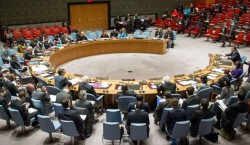Can Asia help Myanmar find a way out of coup crisis?
- 2021-02-26 16:09:06


 Pierre Rayer: Art, Science, and Happiness: The Universal Mission of Transmission to Future Generations through Patronage at the Louvre Abu Dhabi
Pierre Rayer: Art, Science, and Happiness: The Universal Mission of Transmission to Future Generations through Patronage at the Louvre Abu Dhabi Ahly crowned Super champions after dramatic extra-time win over Modern Future FC
Ahly crowned Super champions after dramatic extra-time win over Modern Future FC Yemeni Honey..A Development Wealth Threatened By Conflict And Climate Change
Yemeni Honey..A Development Wealth Threatened By Conflict And Climate Change California wildfires: Millions warned of possible power cut
California wildfires: Millions warned of possible power cut Central African rebels launch attacks near capital
Central African rebels launch attacks near capital Israel army strikes 4 towns in southern Lebanon after evacuation orders
Israel army strikes 4 towns in southern Lebanon after evacuation orders UNSC to Hold Mid-Month Meeting on Yemen
UNSC to Hold Mid-Month Meeting on Yemen Doctor jailed for supplying ketamine to ‘Friends’ star Matthew Perry
Doctor jailed for supplying ketamine to ‘Friends’ star Matthew Perry UAE bids to sweep Africa into its AI industrial revolution
UAE bids to sweep Africa into its AI industrial revolution Al-Qaeda in Yemen Confirms Death of Senior Leader Abu al-Haija al-Hadidi
Al-Qaeda in Yemen Confirms Death of Senior Leader Abu al-Haija al-Hadidi
